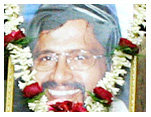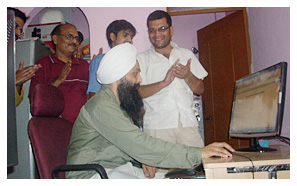 पुण्यतिथि पर विशेष : While discussing the various aspects of Gandhi ji’s epic life and times, we unconsciously either ignore or forget his invaluable contribution as a journalist. As a journalist, Gandhi ji reached out to millions of people and convinced them of his cause. His journalism belonged to an era when there was neither Radio nor television. Such was the power of his pen that whatever he said and wrote reached the farthest corners of this country and world. Mahatma Gandhi’s papers like Young India, Indian Opinion, Harijan and Navajivan, could not boast a circulation of more than a few thousand copies. But such was Gandhi’s grasp of the basics of mass communication that he ensured that his daily views on various issues reached all. There is a story as to how he became a journalist. It is said that during his heady days in South Africa, his friend and a Christian missionary, Joseph Doke suggested that he should publish a newspaper in order to reach to wider audience.
पुण्यतिथि पर विशेष : While discussing the various aspects of Gandhi ji’s epic life and times, we unconsciously either ignore or forget his invaluable contribution as a journalist. As a journalist, Gandhi ji reached out to millions of people and convinced them of his cause. His journalism belonged to an era when there was neither Radio nor television. Such was the power of his pen that whatever he said and wrote reached the farthest corners of this country and world. Mahatma Gandhi’s papers like Young India, Indian Opinion, Harijan and Navajivan, could not boast a circulation of more than a few thousand copies. But such was Gandhi’s grasp of the basics of mass communication that he ensured that his daily views on various issues reached all. There is a story as to how he became a journalist. It is said that during his heady days in South Africa, his friend and a Christian missionary, Joseph Doke suggested that he should publish a newspaper in order to reach to wider audience.
Incidentally, Doke also authored his first biography. On the suggestion of Doke, he started a weekly newspaper, Indian Opinion in June, 1903. He was clear about the nature and content of his newspaper. It would not carry any advertisements nor try to make money. Instead, he sought subscribers who would give donations. It published every Saturday. He edited he paper until he left South Africa in 1914. It was while writing in Indian Opinion that Gandhi ji stumbled on the concept of Satyagraha. Indian Opinion more or less forced the South African provincial regimes to modify their repressive laws against Indians.
The early years of Indian Opinion are the subject of a fascinating essay by the Cape Town-based historian Uma Mesthrie. She points out that Gandhi’s journal was not in fact the first Indian newspaper in South Africa. That honour goes to the Indian World, a periodical started in 1898 by an expatriate from Madras named P. S. Aiyar. This paper soon folded up, but in 1901 Aiyar launched another called Colonial Indian News.
Mesthrie also pays due attention to the men who helped Gandhi run Indian Opinion in its formative years. They included Madanajit Viyavaharik, a former Bombay schoolteacher who was the periodical’s first proprietor and printer; and M.H. Nazar, originally from Surat, who was its first editor. Two Westerners played a critical role in its financing and production. These were Henry Polak and Albert West, both of whom, appropriately enough, Gandhi first met in a vegetarian restaurant.
After Gandhi’s departure from South Africa in 1914, the journal carried on its fight on behalf of the Indian community. From 1918 to 1956 Indian Opinion was edited by his son Manilal Gandhi. Before we move further, it has to be mentioned here that Bapu’s youngest son, Devdas Gandhi was also a journalist and he remained the editor of Hindustan Times for many years. He also used to live in HT house during those days when it used to publish from Connaught Place. HT shifted to its present building in 1975 only.
So long as Bapu was in South Africa, Indian Opinion was both a mirror to Gandhi’s ideas and a voice for his movement. In his Autobiography, he claimed that “satyagraha would probably have been impossible without Indian Opinion”. It was this belief that inspired him to begin a journal of his own in India. Thus in 1919 he started the weekly Young India, to promote his views on politics and religion and a hundred other topics besides. Fourteen years later the periodical changed its name, to Harijan, but its aims were unchanged: to serve as a vehicle for the thoughts and struggles of India’s most influential man.
The Collected Works of Mahatma Gandhi that run to almost a hundred volumes draw massively from his writings in the three journals he founded and edited. To dip into these volumes at random, or with focused intent, is to be acquainted not only with the originality of Gandhi the thinker, but also with the persuasiveness of Gandhi the writer.
In 1919 Gandhi ji started two weeklies in India, Young India and Navjivan and issued it regularly all his life except for the durations during which the government ceased the press. In 1933 Gandhi added a third weekly, Harijan and ran it all his life except when the press was ceased. One must remember the act than more than 80 per cent of the content in his papers came from his own pen. It is estimated that during his lifetime Gandhi wrote more than 10 million words. That translates into 500 words every day for 50 years. And all his writing was related to personal improvement, and social and political reform.
Between 1933 and 1940, Harijan (English), Harijan Bandu (Gujarati) and Harijan Sevak (Hindi) became the Mahatma’s voice to the people of India. These newspapers found the Mahatma concentrating on social and economic problems.
Before the publication of Indian Opinin, Gandhiji started his focus on Letters to Editor, but soon realized that occasional writings and the hospitality of newspapers were inadequate for the political campaign he had launched. He needed a mouthpiece to reach out to the people; so in June 1903 he launched Indian Opinion. It served the purpose of a weekly newsletter which disseminated the news of the week among the Indian community.
 In the end, it can be safely said that efforts should be made by one and all so that this part of Bapu’s personality can also be highlighted as well as researched.
In the end, it can be safely said that efforts should be made by one and all so that this part of Bapu’s personality can also be highlighted as well as researched.
Vivek Shukla is a senior journalist. He can be contacted at [email protected]














